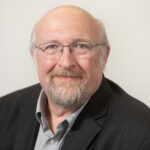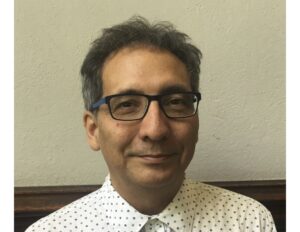Short-Term Visiting Fellows 2022-23
Short-Term Visiting Fellows
The Glasscock Center Short-Term Visiting Fellowships bring distinguished scholars, artists, and performers to Texas A&M University. Both individuals and groups of the Texas A&M faculty may nominate Visiting Fellows who will contribute to the Glasscock Center’s mission to foster and celebrate the humanities and humanities research at Texas A&M.

Fellowship Details:
Dr. Thumma will be in residence at Texas A&M during the week of March 6, 2023.
Dr. Thumma will deliver a public lecture on Wednesday, March 8, 2023 at 10:30am in GLAS 311, entitled "Reimagining Religious Community, Institutions and the State of Christianity in a Post Pandemic World."
Dr. Scott L. Thumma | Professor of Sociology of Religion and director of the Hartford Institute for Religion Research
Scott L. Thumma is Professor of Sociology of Religion and director of the Hartford Institute for Religion Research (www.hartfordinstitute.org) at Hartford Seminary, Hartford, Connecticut. He has published numerous articles, research reports, and chapters on religious life in addition to co-authoring three books, The Other 80 Percent, Beyond Megachurch Myths, and Gay Religion. He has researched and written on megachurches, evangelicalism, gay religious life, congregational studies, the rise of nondenominational churches, the impact of the Internet technology, and the changing religious landscape.
Scott is the Principal Investigator for 5-year Lilly Endowment grant to study the impact of the pandemic on churches (www.covidreligionresearch.org) and a Thriving in Ministry grant. He co-leads the Faith Communities Today (www.faithcommunitiestoday.org) national research project and has also conducted 7 national studies of megachurches and 3 national studies of nondenominational churches. He is a member of the committee that recently conducted the 2020 US Religion Census of US congregations.

Fellowship Details:
Dr. De Genova will be in residence at Texas A&M during the week of March 20, 2023.
Dr. De Genova will deliver a public lecture on Thursday, March 23, 2023 at 2pm in GLAS 311, entitled "Human Mobility and the Vexations of Anthropology: Reflections on Racial Capitalism, Migrant Labor, Borders, and Global Space"
Dr. Nicholas De Genova | Professor and Chair of the Department of Comparative Cultural Studies at the University of Houston
Nicholas De Genova (Ph.D., Anthropology, University of Chicago 1999) holds an appointment as Professor and Chair of the Department of Comparative Cultural Studies at the University of Houston.
Beginning in 2020, following the police murder of George Floyd in Minneapolis, Professor De Genova was appointed to chair a Special Committee on Race and Social Justice in the College of Liberal Arts and Social Sciences at the University of Houston.
Professor De Genova's academic work has contributed to multiple disciplines, including anthropology, sociology, geography, and political science, as well as the interdisciplinary fields of migration studies, border studies, citizenship studies, sociolegal studies, cultural studies, urban studies, postcolonial studies, American studies, European studies, and ethnic studies -- specifically, Latino/a/x studies, African American studies, Asian American studies, Native American studies, and Arab American studies. He is also a social and political theorist and critic.
For more details about Dr. De Genova's visit, contact Dr. Sergio Lemus at slemus@tamu.edu.
"Human Mobility and the Vexations of Anthropology: Reflections on Racial Capitalism, Migrant Labor, Borders, and Global Space"
Abstract:
A reconsideration of the crucial historical role of slavery in the consolidation of the global regime of capital accumulation provides a vital source of critique for our postcolonial present. The Atlantic slave trade literally transformed African men and women into human commodities. The reduction of human beings into human commodities, or “human capital” — indeed, into labor and nothing but labor — which was the very essence of modern slavery, served as a necessary predicate for the consolidation and perfecting of what Marx called “labor in the abstract,” and requires us to re-situate enslaved labor as the defining and constitutive limit for how we comprehend labor as such under capitalism. The production of labor in the abstract, or labor “in general,” depended nonetheless upon concrete productions of sociopolitical difference, particularly the branding of race. From the outset, capitalism was inextricable from the sociopolitical production of race. In other words, capitalism has never been other than racial capitalism. These insights into the racial dynamics at the heart of capitalism are not merely of historiographic interest, however; instead, they must be re-purposed toward the ends of elaborating a deeper understanding of migrant labor within our contemporary global postcolonial condition, and how borders serve as means for the production of difference — both the racialized difference that brands migrants and the spatialized difference by which states sub-divide the space of the planet according to the metaphysics of nationalism.
Cultural anthropology has conventionally taken as some of its most cherished foundational premises the precise opposites of key concepts that are indispensable for a critical knowledge of the contemporary sociopolitical world. Instead of labor in the abstract, anthropology has produced exquisite inventories of concrete laboring activities and the “cultural” content of productive work; against the impermanence and mutability of lives characterized by their mobility, the ethnographic enterprise has been deeply attached to the sedentarist presuppositions of lasting settlement, dwelling, and “community”; and contrary to the task of apprehending social space on a global scale, ethnographic study has been overwhelmingly localized and place-bound. Rethinking these elementary premises of the ethnographic endeavor and situating these critical concepts at the center of our epistemological frameworks are crucial theoretical and practical tasks for any meaningful social inquiry today. The prospective convergence of genuinely critical socio-political inquiry with the techniques and insights of anthropology therefore remains for us the locus of an urgent problem -- an open question on an open horizon.

Fellowship Details:
Dr. Cadava will be in residence at Texas A&M during the week of April 17, 2023.
Dr. Cadava will deliver a public lecture on Thursday, April 20, 2023 at 3pm in GLAS 311, entitled "'Training History to Read': Fazal Sheikh’s The Erasure Trilogy."
Dr. Eduardo Cadava | Philip Mayhew Professor of English at Princeton University
Eduardo Cadava is Philip Mayhew Professor of English at Princeton University. He is the author of Words of Light: Theses on the Photography of History (Princeton UP), Emerson and the Climates of History (Stanford UP), and, most recently, Paper Graveyards (MIT). He has co-edited Who Comes After the Subject (Routledge), Cities Without Citizens (Slought Foundation / Rosenbach Museum), and The Itinerant Languages of Photography (Princeton University Art Museum and Yale UP). He also has translated works by Jacques Derrida, Philippe Lacoue-Labarthe, and Maurice Blanchot, and has co-translated Nadar's memoirs, Quand j'étais photographe, which appeared under the title When I Was a Photographer(MIT). He is the President of the Executive Board of the Slought Foundation in Philadelphia and he has co-curated installations and exhibitions at the Slought Foundation, the MAXXI Museum in Rome, Storefront for Art and Architecture in New York, the Al-Ma’mal Center for Contemporary Art in East Jerusalem, and the Princeton University Art Museum. He is presently co-directing, with Eyal Weizman, a multiyear project on the relation between political conflict and climate change entitled Conflict Shorelines that includes field work in Amazonia, the Negev desert, and the Arctic, and collaborating with Fazal Sheikh on a project entitled Exposure that documents the ruination of the Utah landscape by uranium mining and oil and gas drilling and the consequences of this ruination on native communities. He received the President’s Award for Distinguished Teaching in 2018 and, in 2019, he was awarded honorary Greek citizenship for “promoting Greek culture abroad.”
Dr. Cadava will participate in various activities during the week. See more detail below and contact Dr. Alberto Moreiras with questions at moreiras@tamu.edu
**Dr. Cadava has provided readings for discussion for those who plan to attend any of his events during the week.
Download here.
Tuesday, April 18, 2023, 2:00-3:30 | GLAS 311
Conversation: “The Art of Reading Historically”
This conversation—a kind of introduction to Cadava’s work—will take its point of departure from three essays from his recent book, Paper Graveyards—“Drawing in Tongues,” “Trees, Hands, Stars, and Veils,” and “Learning to See.” An optional fourth essay is available, “Lessons of the Hour,” which is on the COVID pandemic as a postscript of the book. Each of the pieces have to do with how to read images historically and politically.
Wednesday, April 19, 2023, 5:30 to 8:30 | ACAD 206
"Walter Benjamin’s Mexican Dreams”
Dr. Alberto Moreiras’s graduate seminar on Mexicans in the US.
Cadava will present an excerpt from Politically Red on the two Mexican dreams that Walter Benjamin recounts in One-Way Street: Mexican Embassy and Underground Works.
Thursday, April 20, 2023, 12:00-1:30 | GLAS 311
"Conflict Shorelines”
A meeting with the “Humanities and the Anthropocene” collective.
Cadava will discuss the “Conflict Shorelines” project he is doing with Eyal Weizman and the “Exposure” project he is doing with Fazal Sheikh.
Thursday, April 20, 2023, 3:00-4:30 | GLAS 311
Public Lecture: “‘Training History to Read’: Fazal Sheikh’s The Erasure Trilogy”
This talk takes its point of departure from the award-winning human rights photographer Fazal Sheikh’s multi-volume project on the Israeli-Palestinian conflict, The Erasure Trilogy (2015). Exploring the legacies of the Arab-Israeli War of 1948, this project imagines the possibility of exposing and countering the various processes of erasure that, over the last several decades, have sought to erase both the violence of this history and the acts of erasure themselves. The result of this devastation is legible in the fact that Palestinians, Bedouins, and Israelis all find themselves in mourning. What they mourn is themselves, but also their ability to relate to the other. In asking us to be attentive to the history that simultaneously divides and binds these populations—because, for him, the history of the one can never be disentangled from the history of the other—Sheikh hopes to lay the groundwork for a potentially transformative empathy.
